Organisational Behaviour Report: Tesco PLC, Leadership, and Culture
VerifiedAdded on 2023/01/19
|15
|4678
|35
Report
AI Summary
This report delves into the intricacies of organisational behaviour, using Tesco PLC as a case study. It examines the impact of organisational culture, politics, and power on employee behaviour, exploring various cultural frameworks like Handy's cultural typology and Hofstede's dimensions. The report also analyzes motivational theories, including extrinsic and intrinsic motivation, content theories (Maslow's hierarchy, Herzberg), and process theories (expectancy, equity, goal-setting). Furthermore, it discusses the application of network and systems theories in understanding organisational dynamics. The report highlights how these factors influence employee engagement, job satisfaction, and overall productivity, offering insights for effective management and leadership strategies to achieve organisational goals. This report provides a comprehensive overview of organisational behaviour, incorporating relevant theories and practical applications within a real-world business context, contributing to a deeper understanding of workplace dynamics.
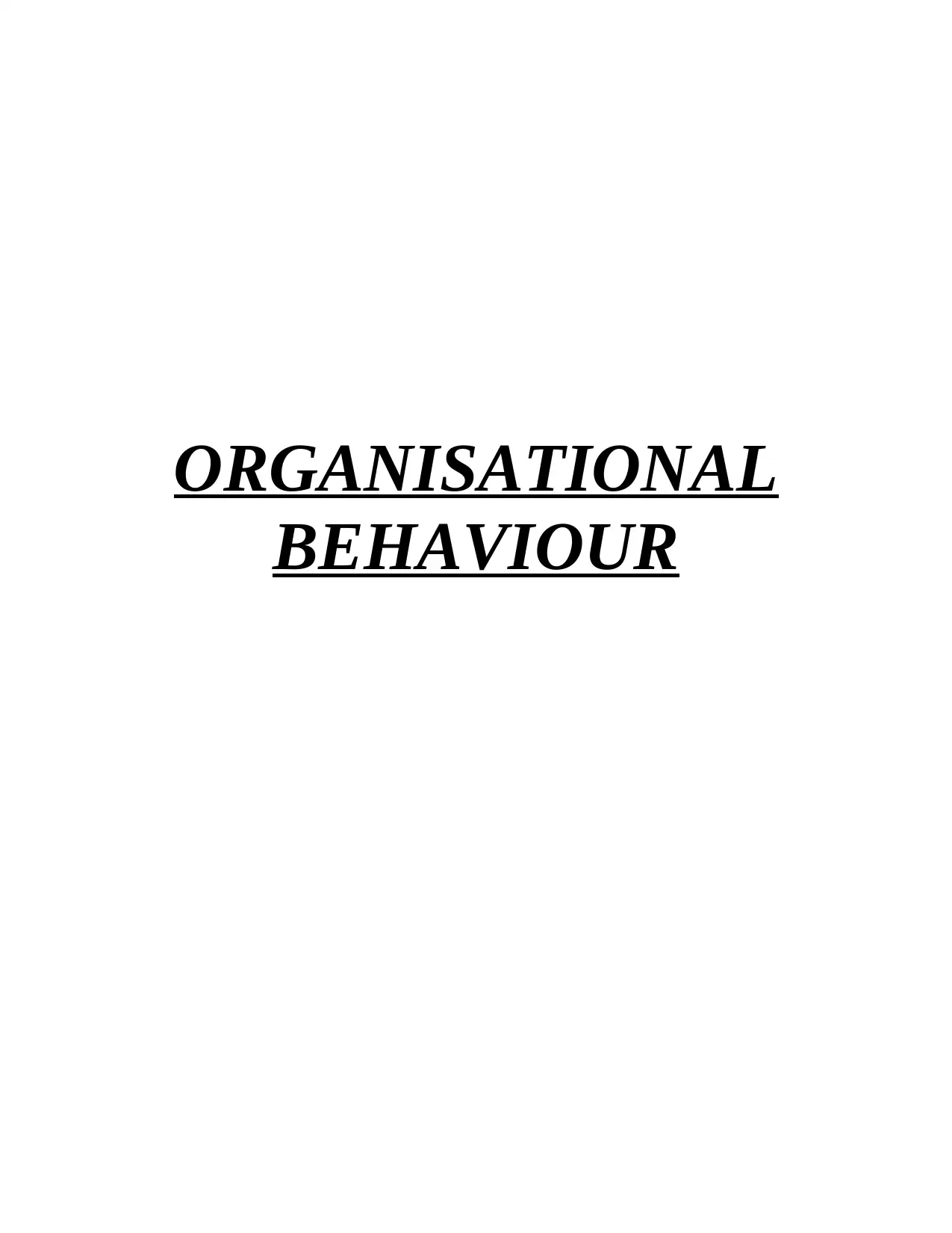
ORGANISATIONAL
BEHAVIOUR
BEHAVIOUR
Paraphrase This Document
Need a fresh take? Get an instant paraphrase of this document with our AI Paraphraser
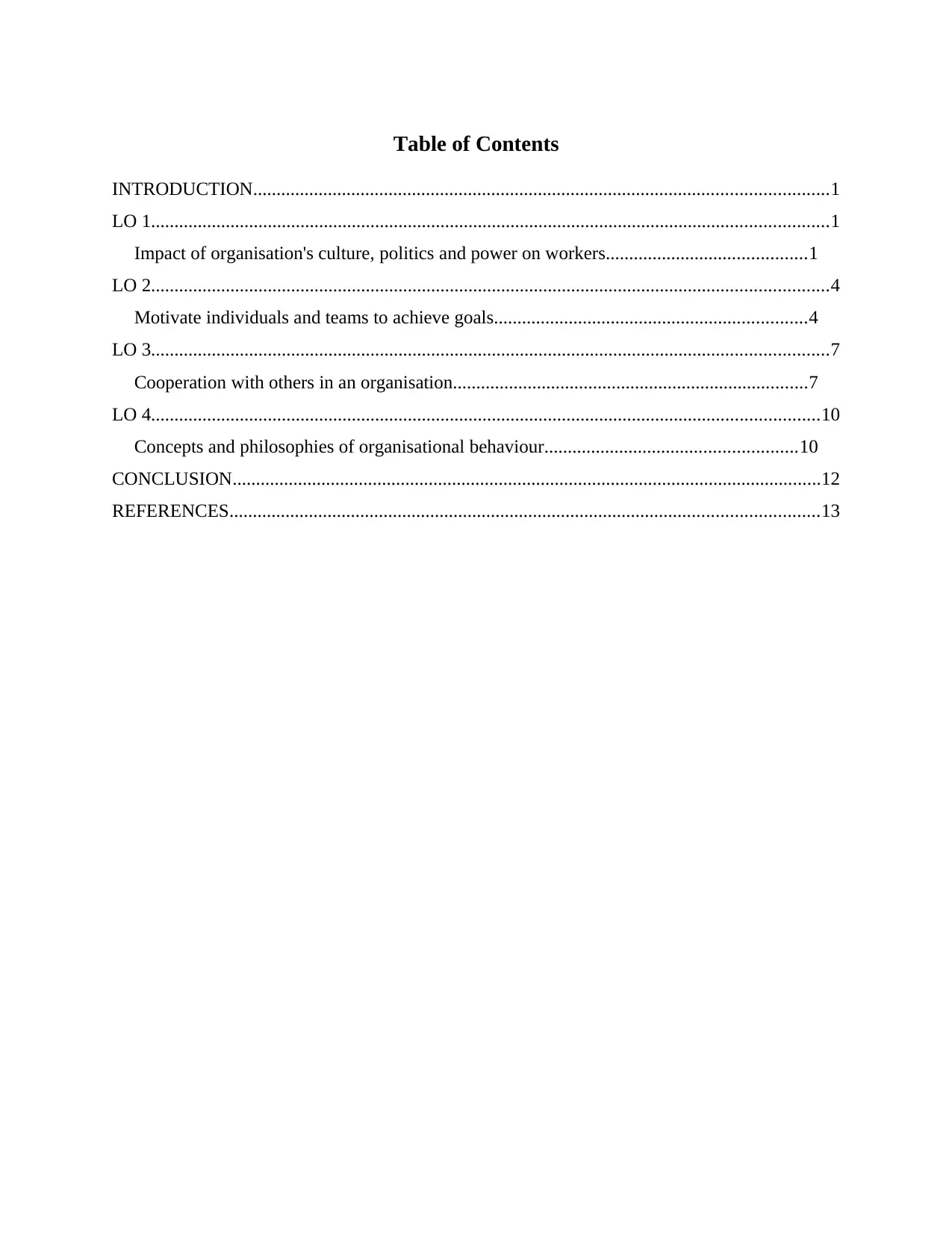
Table of Contents
INTRODUCTION...........................................................................................................................1
LO 1.................................................................................................................................................1
Impact of organisation's culture, politics and power on workers...........................................1
LO 2.................................................................................................................................................4
Motivate individuals and teams to achieve goals...................................................................4
LO 3.................................................................................................................................................7
Cooperation with others in an organisation............................................................................7
LO 4...............................................................................................................................................10
Concepts and philosophies of organisational behaviour......................................................10
CONCLUSION..............................................................................................................................12
REFERENCES..............................................................................................................................13
INTRODUCTION...........................................................................................................................1
LO 1.................................................................................................................................................1
Impact of organisation's culture, politics and power on workers...........................................1
LO 2.................................................................................................................................................4
Motivate individuals and teams to achieve goals...................................................................4
LO 3.................................................................................................................................................7
Cooperation with others in an organisation............................................................................7
LO 4...............................................................................................................................................10
Concepts and philosophies of organisational behaviour......................................................10
CONCLUSION..............................................................................................................................12
REFERENCES..............................................................................................................................13
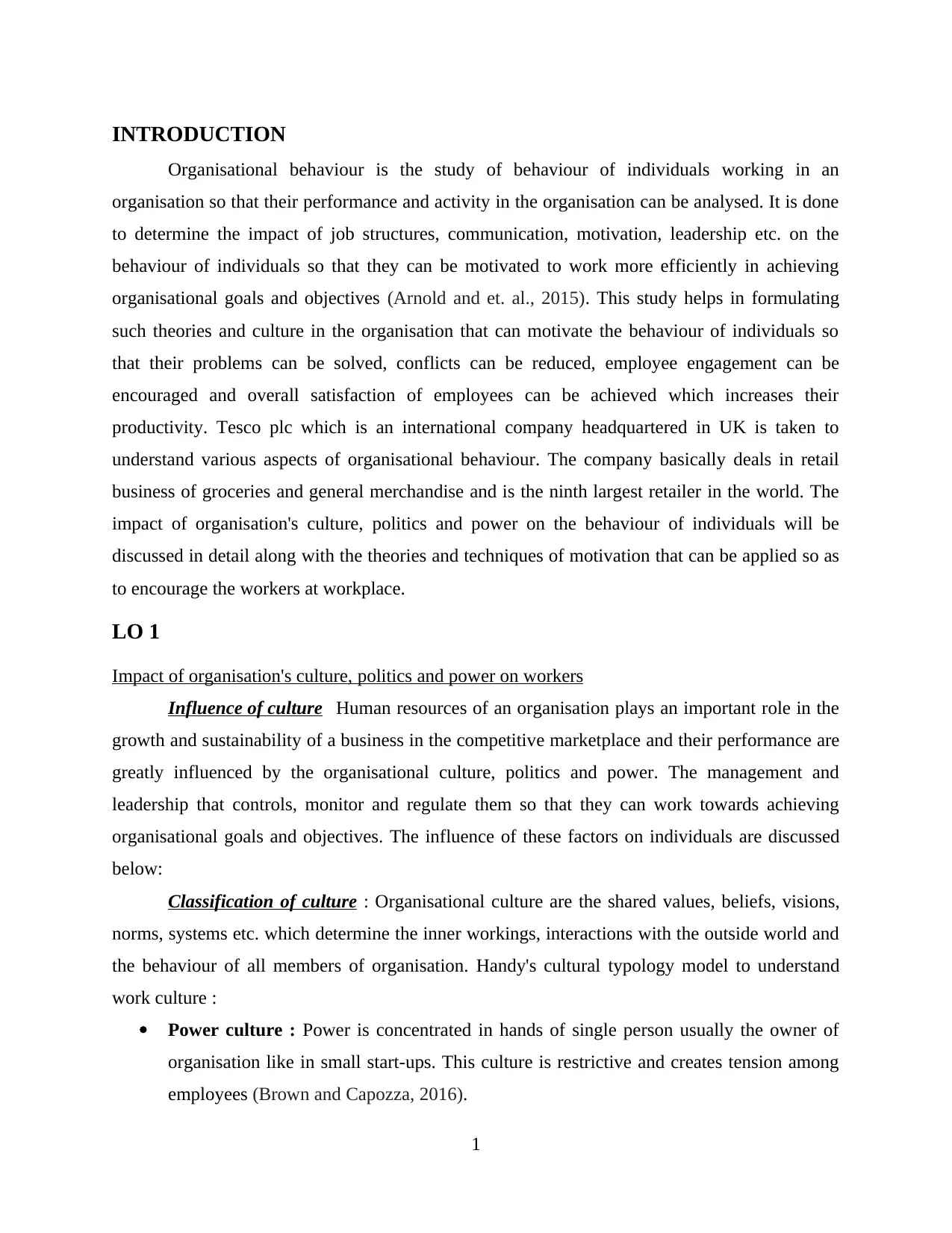
INTRODUCTION
Organisational behaviour is the study of behaviour of individuals working in an
organisation so that their performance and activity in the organisation can be analysed. It is done
to determine the impact of job structures, communication, motivation, leadership etc. on the
behaviour of individuals so that they can be motivated to work more efficiently in achieving
organisational goals and objectives (Arnold and et. al., 2015). This study helps in formulating
such theories and culture in the organisation that can motivate the behaviour of individuals so
that their problems can be solved, conflicts can be reduced, employee engagement can be
encouraged and overall satisfaction of employees can be achieved which increases their
productivity. Tesco plc which is an international company headquartered in UK is taken to
understand various aspects of organisational behaviour. The company basically deals in retail
business of groceries and general merchandise and is the ninth largest retailer in the world. The
impact of organisation's culture, politics and power on the behaviour of individuals will be
discussed in detail along with the theories and techniques of motivation that can be applied so as
to encourage the workers at workplace.
LO 1
Impact of organisation's culture, politics and power on workers
Influence of culture Human resources of an organisation plays an important role in the
growth and sustainability of a business in the competitive marketplace and their performance are
greatly influenced by the organisational culture, politics and power. The management and
leadership that controls, monitor and regulate them so that they can work towards achieving
organisational goals and objectives. The influence of these factors on individuals are discussed
below:
Classification of culture : Organisational culture are the shared values, beliefs, visions,
norms, systems etc. which determine the inner workings, interactions with the outside world and
the behaviour of all members of organisation. Handy's cultural typology model to understand
work culture :
Power culture : Power is concentrated in hands of single person usually the owner of
organisation like in small start-ups. This culture is restrictive and creates tension among
employees (Brown and Capozza, 2016).
1
Organisational behaviour is the study of behaviour of individuals working in an
organisation so that their performance and activity in the organisation can be analysed. It is done
to determine the impact of job structures, communication, motivation, leadership etc. on the
behaviour of individuals so that they can be motivated to work more efficiently in achieving
organisational goals and objectives (Arnold and et. al., 2015). This study helps in formulating
such theories and culture in the organisation that can motivate the behaviour of individuals so
that their problems can be solved, conflicts can be reduced, employee engagement can be
encouraged and overall satisfaction of employees can be achieved which increases their
productivity. Tesco plc which is an international company headquartered in UK is taken to
understand various aspects of organisational behaviour. The company basically deals in retail
business of groceries and general merchandise and is the ninth largest retailer in the world. The
impact of organisation's culture, politics and power on the behaviour of individuals will be
discussed in detail along with the theories and techniques of motivation that can be applied so as
to encourage the workers at workplace.
LO 1
Impact of organisation's culture, politics and power on workers
Influence of culture Human resources of an organisation plays an important role in the
growth and sustainability of a business in the competitive marketplace and their performance are
greatly influenced by the organisational culture, politics and power. The management and
leadership that controls, monitor and regulate them so that they can work towards achieving
organisational goals and objectives. The influence of these factors on individuals are discussed
below:
Classification of culture : Organisational culture are the shared values, beliefs, visions,
norms, systems etc. which determine the inner workings, interactions with the outside world and
the behaviour of all members of organisation. Handy's cultural typology model to understand
work culture :
Power culture : Power is concentrated in hands of single person usually the owner of
organisation like in small start-ups. This culture is restrictive and creates tension among
employees (Brown and Capozza, 2016).
1
⊘ This is a preview!⊘
Do you want full access?
Subscribe today to unlock all pages.

Trusted by 1+ million students worldwide
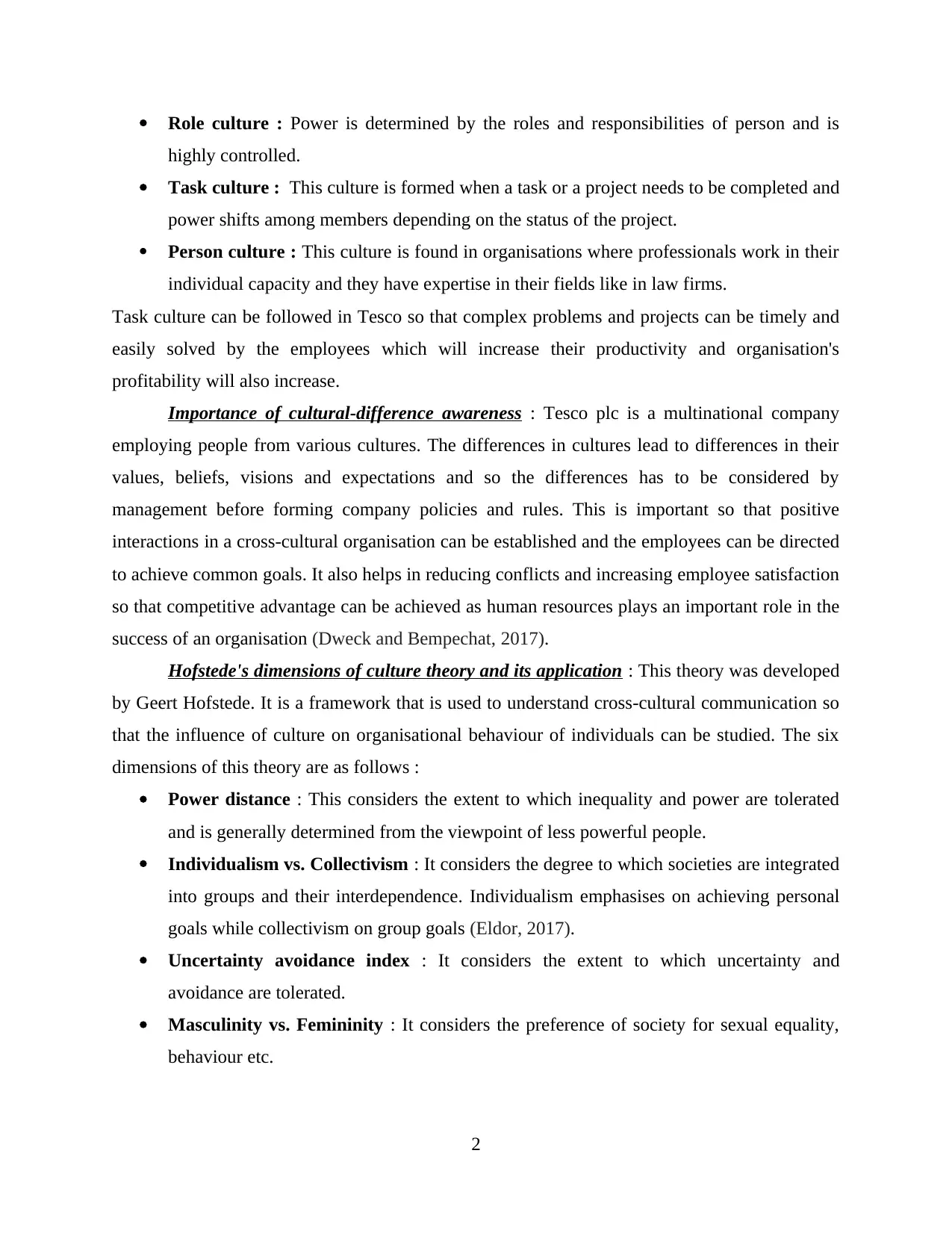
Role culture : Power is determined by the roles and responsibilities of person and is
highly controlled.
Task culture : This culture is formed when a task or a project needs to be completed and
power shifts among members depending on the status of the project.
Person culture : This culture is found in organisations where professionals work in their
individual capacity and they have expertise in their fields like in law firms.
Task culture can be followed in Tesco so that complex problems and projects can be timely and
easily solved by the employees which will increase their productivity and organisation's
profitability will also increase.
Importance of cultural-difference awareness : Tesco plc is a multinational company
employing people from various cultures. The differences in cultures lead to differences in their
values, beliefs, visions and expectations and so the differences has to be considered by
management before forming company policies and rules. This is important so that positive
interactions in a cross-cultural organisation can be established and the employees can be directed
to achieve common goals. It also helps in reducing conflicts and increasing employee satisfaction
so that competitive advantage can be achieved as human resources plays an important role in the
success of an organisation (Dweck and Bempechat, 2017).
Hofstede's dimensions of culture theory and its application : This theory was developed
by Geert Hofstede. It is a framework that is used to understand cross-cultural communication so
that the influence of culture on organisational behaviour of individuals can be studied. The six
dimensions of this theory are as follows :
Power distance : This considers the extent to which inequality and power are tolerated
and is generally determined from the viewpoint of less powerful people.
Individualism vs. Collectivism : It considers the degree to which societies are integrated
into groups and their interdependence. Individualism emphasises on achieving personal
goals while collectivism on group goals (Eldor, 2017).
Uncertainty avoidance index : It considers the extent to which uncertainty and
avoidance are tolerated.
Masculinity vs. Femininity : It considers the preference of society for sexual equality,
behaviour etc.
2
highly controlled.
Task culture : This culture is formed when a task or a project needs to be completed and
power shifts among members depending on the status of the project.
Person culture : This culture is found in organisations where professionals work in their
individual capacity and they have expertise in their fields like in law firms.
Task culture can be followed in Tesco so that complex problems and projects can be timely and
easily solved by the employees which will increase their productivity and organisation's
profitability will also increase.
Importance of cultural-difference awareness : Tesco plc is a multinational company
employing people from various cultures. The differences in cultures lead to differences in their
values, beliefs, visions and expectations and so the differences has to be considered by
management before forming company policies and rules. This is important so that positive
interactions in a cross-cultural organisation can be established and the employees can be directed
to achieve common goals. It also helps in reducing conflicts and increasing employee satisfaction
so that competitive advantage can be achieved as human resources plays an important role in the
success of an organisation (Dweck and Bempechat, 2017).
Hofstede's dimensions of culture theory and its application : This theory was developed
by Geert Hofstede. It is a framework that is used to understand cross-cultural communication so
that the influence of culture on organisational behaviour of individuals can be studied. The six
dimensions of this theory are as follows :
Power distance : This considers the extent to which inequality and power are tolerated
and is generally determined from the viewpoint of less powerful people.
Individualism vs. Collectivism : It considers the degree to which societies are integrated
into groups and their interdependence. Individualism emphasises on achieving personal
goals while collectivism on group goals (Eldor, 2017).
Uncertainty avoidance index : It considers the extent to which uncertainty and
avoidance are tolerated.
Masculinity vs. Femininity : It considers the preference of society for sexual equality,
behaviour etc.
2
Paraphrase This Document
Need a fresh take? Get an instant paraphrase of this document with our AI Paraphraser
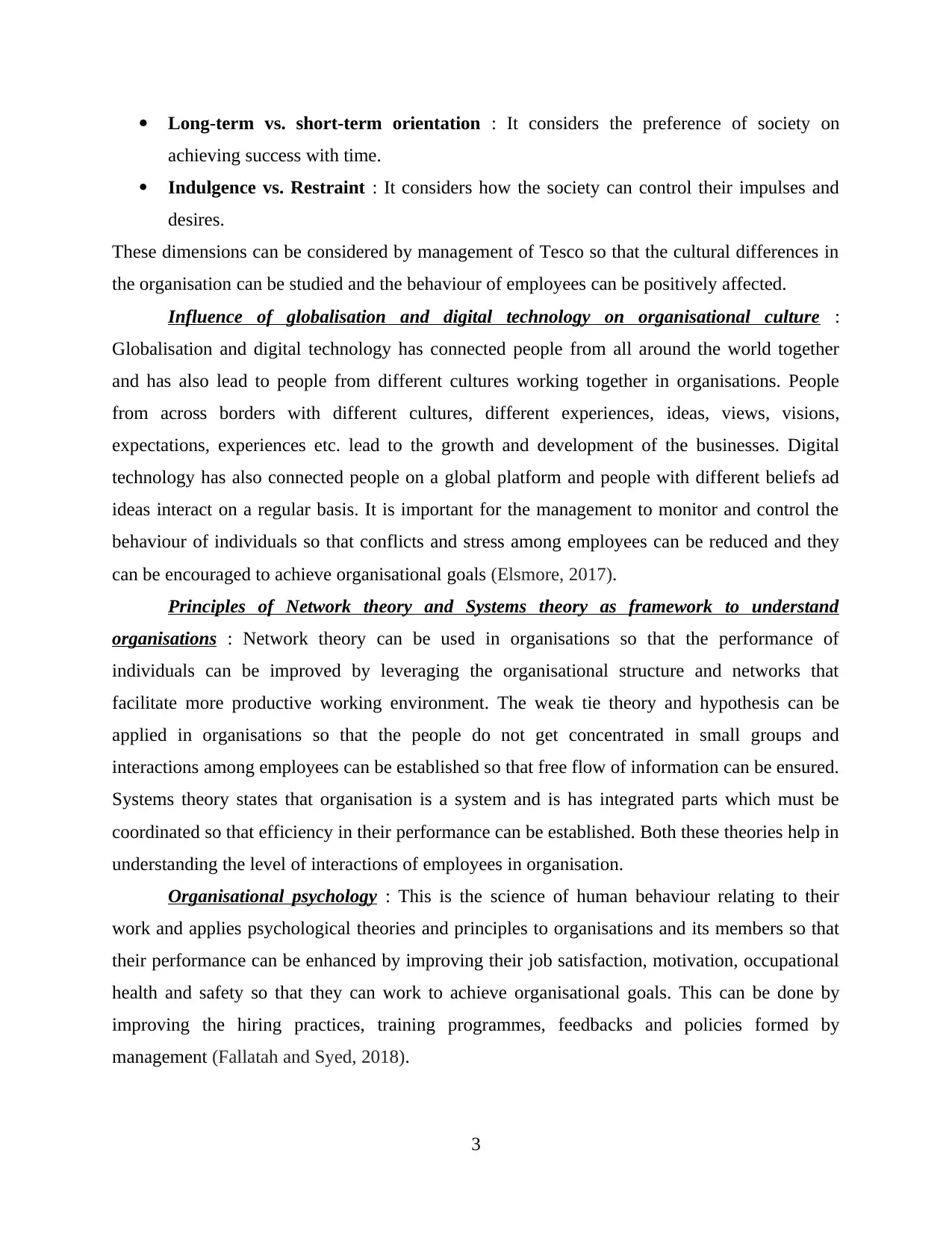
Long-term vs. short-term orientation : It considers the preference of society on
achieving success with time.
Indulgence vs. Restraint : It considers how the society can control their impulses and
desires.
These dimensions can be considered by management of Tesco so that the cultural differences in
the organisation can be studied and the behaviour of employees can be positively affected.
Influence of globalisation and digital technology on organisational culture :
Globalisation and digital technology has connected people from all around the world together
and has also lead to people from different cultures working together in organisations. People
from across borders with different cultures, different experiences, ideas, views, visions,
expectations, experiences etc. lead to the growth and development of the businesses. Digital
technology has also connected people on a global platform and people with different beliefs ad
ideas interact on a regular basis. It is important for the management to monitor and control the
behaviour of individuals so that conflicts and stress among employees can be reduced and they
can be encouraged to achieve organisational goals (Elsmore, 2017).
Principles of Network theory and Systems theory as framework to understand
organisations : Network theory can be used in organisations so that the performance of
individuals can be improved by leveraging the organisational structure and networks that
facilitate more productive working environment. The weak tie theory and hypothesis can be
applied in organisations so that the people do not get concentrated in small groups and
interactions among employees can be established so that free flow of information can be ensured.
Systems theory states that organisation is a system and is has integrated parts which must be
coordinated so that efficiency in their performance can be established. Both these theories help in
understanding the level of interactions of employees in organisation.
Organisational psychology : This is the science of human behaviour relating to their
work and applies psychological theories and principles to organisations and its members so that
their performance can be enhanced by improving their job satisfaction, motivation, occupational
health and safety so that they can work to achieve organisational goals. This can be done by
improving the hiring practices, training programmes, feedbacks and policies formed by
management (Fallatah and Syed, 2018).
3
achieving success with time.
Indulgence vs. Restraint : It considers how the society can control their impulses and
desires.
These dimensions can be considered by management of Tesco so that the cultural differences in
the organisation can be studied and the behaviour of employees can be positively affected.
Influence of globalisation and digital technology on organisational culture :
Globalisation and digital technology has connected people from all around the world together
and has also lead to people from different cultures working together in organisations. People
from across borders with different cultures, different experiences, ideas, views, visions,
expectations, experiences etc. lead to the growth and development of the businesses. Digital
technology has also connected people on a global platform and people with different beliefs ad
ideas interact on a regular basis. It is important for the management to monitor and control the
behaviour of individuals so that conflicts and stress among employees can be reduced and they
can be encouraged to achieve organisational goals (Elsmore, 2017).
Principles of Network theory and Systems theory as framework to understand
organisations : Network theory can be used in organisations so that the performance of
individuals can be improved by leveraging the organisational structure and networks that
facilitate more productive working environment. The weak tie theory and hypothesis can be
applied in organisations so that the people do not get concentrated in small groups and
interactions among employees can be established so that free flow of information can be ensured.
Systems theory states that organisation is a system and is has integrated parts which must be
coordinated so that efficiency in their performance can be established. Both these theories help in
understanding the level of interactions of employees in organisation.
Organisational psychology : This is the science of human behaviour relating to their
work and applies psychological theories and principles to organisations and its members so that
their performance can be enhanced by improving their job satisfaction, motivation, occupational
health and safety so that they can work to achieve organisational goals. This can be done by
improving the hiring practices, training programmes, feedbacks and policies formed by
management (Fallatah and Syed, 2018).
3
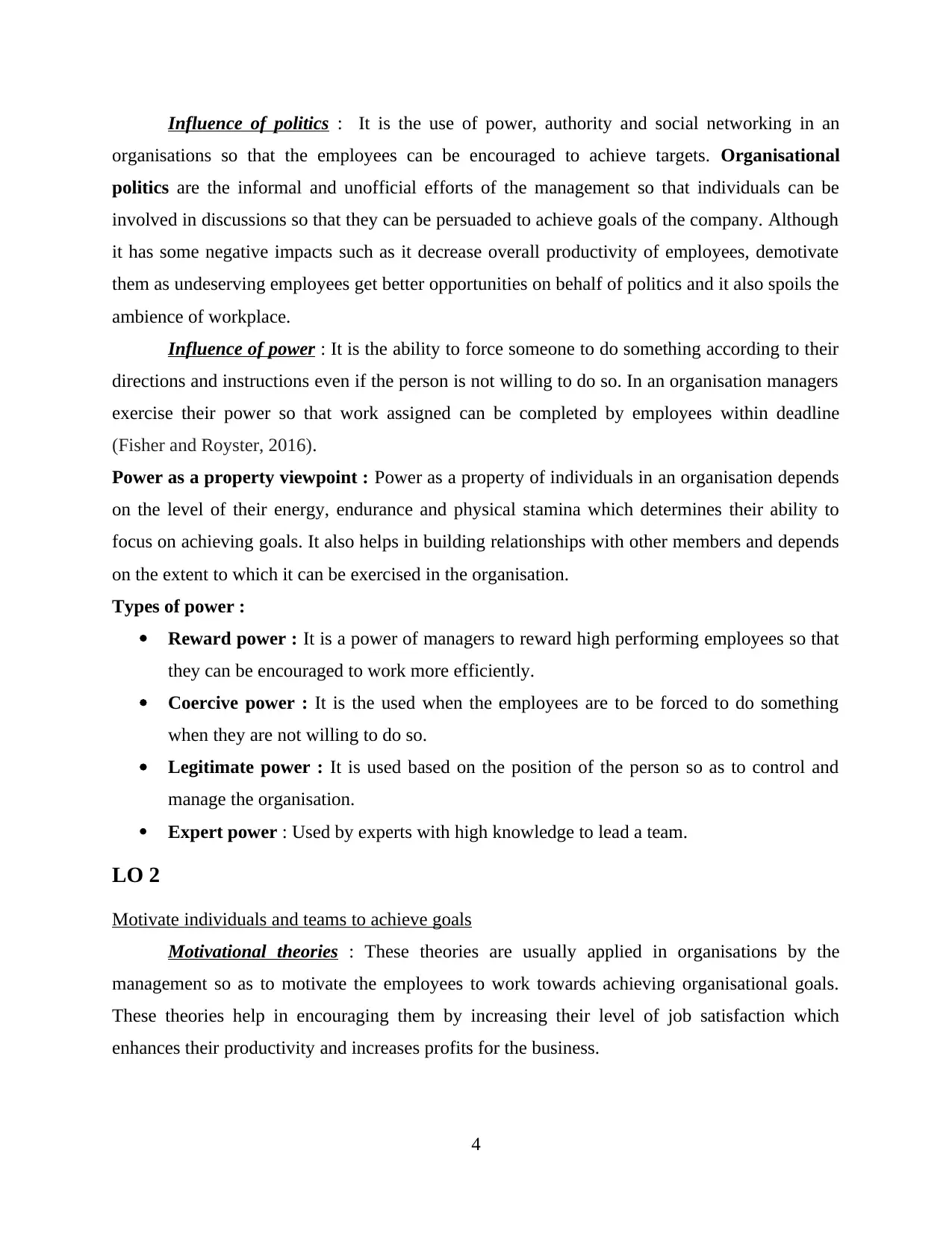
Influence of politics : It is the use of power, authority and social networking in an
organisations so that the employees can be encouraged to achieve targets. Organisational
politics are the informal and unofficial efforts of the management so that individuals can be
involved in discussions so that they can be persuaded to achieve goals of the company. Although
it has some negative impacts such as it decrease overall productivity of employees, demotivate
them as undeserving employees get better opportunities on behalf of politics and it also spoils the
ambience of workplace.
Influence of power : It is the ability to force someone to do something according to their
directions and instructions even if the person is not willing to do so. In an organisation managers
exercise their power so that work assigned can be completed by employees within deadline
(Fisher and Royster, 2016).
Power as a property viewpoint : Power as a property of individuals in an organisation depends
on the level of their energy, endurance and physical stamina which determines their ability to
focus on achieving goals. It also helps in building relationships with other members and depends
on the extent to which it can be exercised in the organisation.
Types of power :
Reward power : It is a power of managers to reward high performing employees so that
they can be encouraged to work more efficiently.
Coercive power : It is the used when the employees are to be forced to do something
when they are not willing to do so.
Legitimate power : It is used based on the position of the person so as to control and
manage the organisation.
Expert power : Used by experts with high knowledge to lead a team.
LO 2
Motivate individuals and teams to achieve goals
Motivational theories : These theories are usually applied in organisations by the
management so as to motivate the employees to work towards achieving organisational goals.
These theories help in encouraging them by increasing their level of job satisfaction which
enhances their productivity and increases profits for the business.
4
organisations so that the employees can be encouraged to achieve targets. Organisational
politics are the informal and unofficial efforts of the management so that individuals can be
involved in discussions so that they can be persuaded to achieve goals of the company. Although
it has some negative impacts such as it decrease overall productivity of employees, demotivate
them as undeserving employees get better opportunities on behalf of politics and it also spoils the
ambience of workplace.
Influence of power : It is the ability to force someone to do something according to their
directions and instructions even if the person is not willing to do so. In an organisation managers
exercise their power so that work assigned can be completed by employees within deadline
(Fisher and Royster, 2016).
Power as a property viewpoint : Power as a property of individuals in an organisation depends
on the level of their energy, endurance and physical stamina which determines their ability to
focus on achieving goals. It also helps in building relationships with other members and depends
on the extent to which it can be exercised in the organisation.
Types of power :
Reward power : It is a power of managers to reward high performing employees so that
they can be encouraged to work more efficiently.
Coercive power : It is the used when the employees are to be forced to do something
when they are not willing to do so.
Legitimate power : It is used based on the position of the person so as to control and
manage the organisation.
Expert power : Used by experts with high knowledge to lead a team.
LO 2
Motivate individuals and teams to achieve goals
Motivational theories : These theories are usually applied in organisations by the
management so as to motivate the employees to work towards achieving organisational goals.
These theories help in encouraging them by increasing their level of job satisfaction which
enhances their productivity and increases profits for the business.
4
⊘ This is a preview!⊘
Do you want full access?
Subscribe today to unlock all pages.

Trusted by 1+ million students worldwide
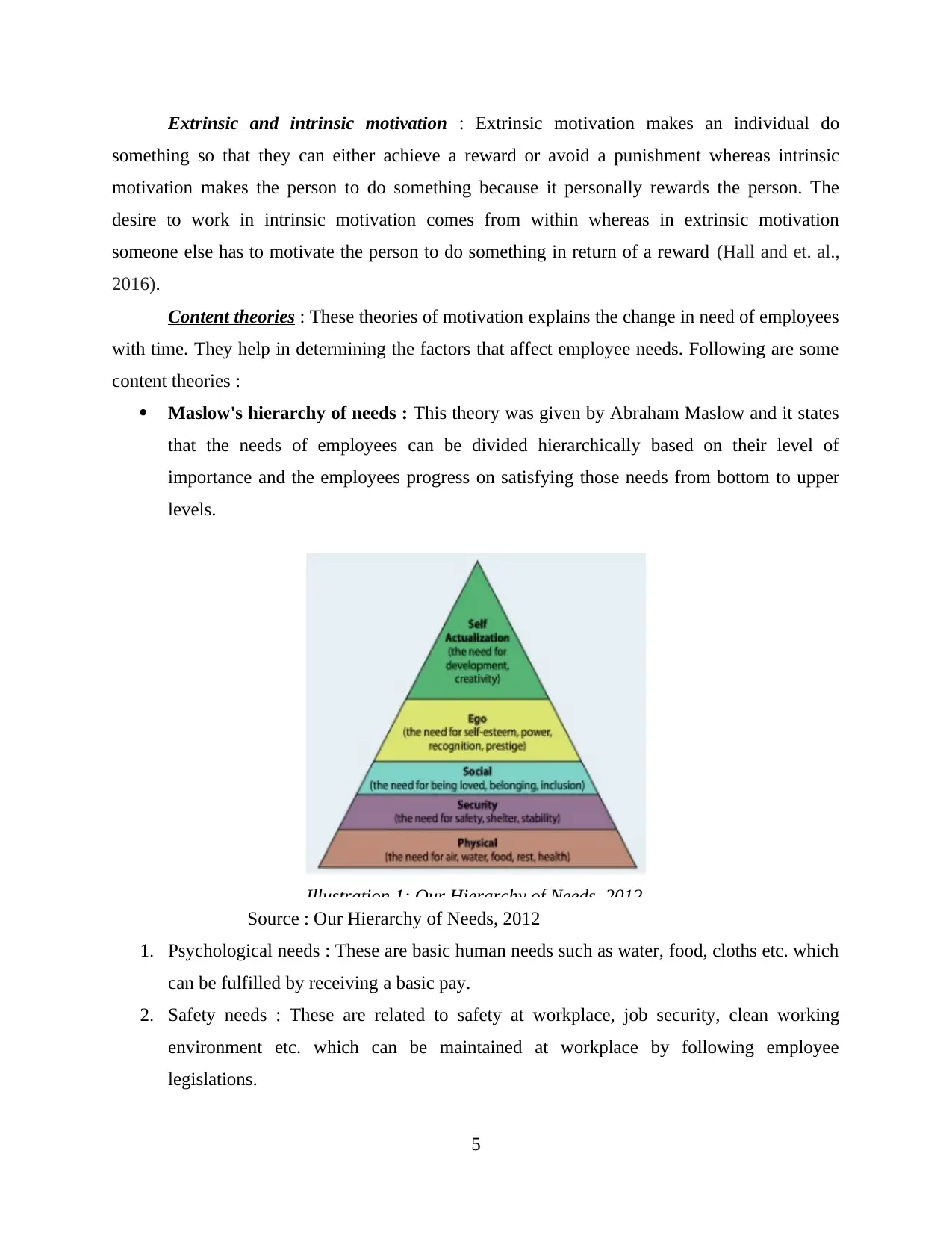
Extrinsic and intrinsic motivation : Extrinsic motivation makes an individual do
something so that they can either achieve a reward or avoid a punishment whereas intrinsic
motivation makes the person to do something because it personally rewards the person. The
desire to work in intrinsic motivation comes from within whereas in extrinsic motivation
someone else has to motivate the person to do something in return of a reward (Hall and et. al.,
2016).
Content theories : These theories of motivation explains the change in need of employees
with time. They help in determining the factors that affect employee needs. Following are some
content theories :
Maslow's hierarchy of needs : This theory was given by Abraham Maslow and it states
that the needs of employees can be divided hierarchically based on their level of
importance and the employees progress on satisfying those needs from bottom to upper
levels.
Source : Our Hierarchy of Needs, 2012
1. Psychological needs : These are basic human needs such as water, food, cloths etc. which
can be fulfilled by receiving a basic pay.
2. Safety needs : These are related to safety at workplace, job security, clean working
environment etc. which can be maintained at workplace by following employee
legislations.
5
Illustration 1: Our Hierarchy of Needs .2012
something so that they can either achieve a reward or avoid a punishment whereas intrinsic
motivation makes the person to do something because it personally rewards the person. The
desire to work in intrinsic motivation comes from within whereas in extrinsic motivation
someone else has to motivate the person to do something in return of a reward (Hall and et. al.,
2016).
Content theories : These theories of motivation explains the change in need of employees
with time. They help in determining the factors that affect employee needs. Following are some
content theories :
Maslow's hierarchy of needs : This theory was given by Abraham Maslow and it states
that the needs of employees can be divided hierarchically based on their level of
importance and the employees progress on satisfying those needs from bottom to upper
levels.
Source : Our Hierarchy of Needs, 2012
1. Psychological needs : These are basic human needs such as water, food, cloths etc. which
can be fulfilled by receiving a basic pay.
2. Safety needs : These are related to safety at workplace, job security, clean working
environment etc. which can be maintained at workplace by following employee
legislations.
5
Illustration 1: Our Hierarchy of Needs .2012
Paraphrase This Document
Need a fresh take? Get an instant paraphrase of this document with our AI Paraphraser
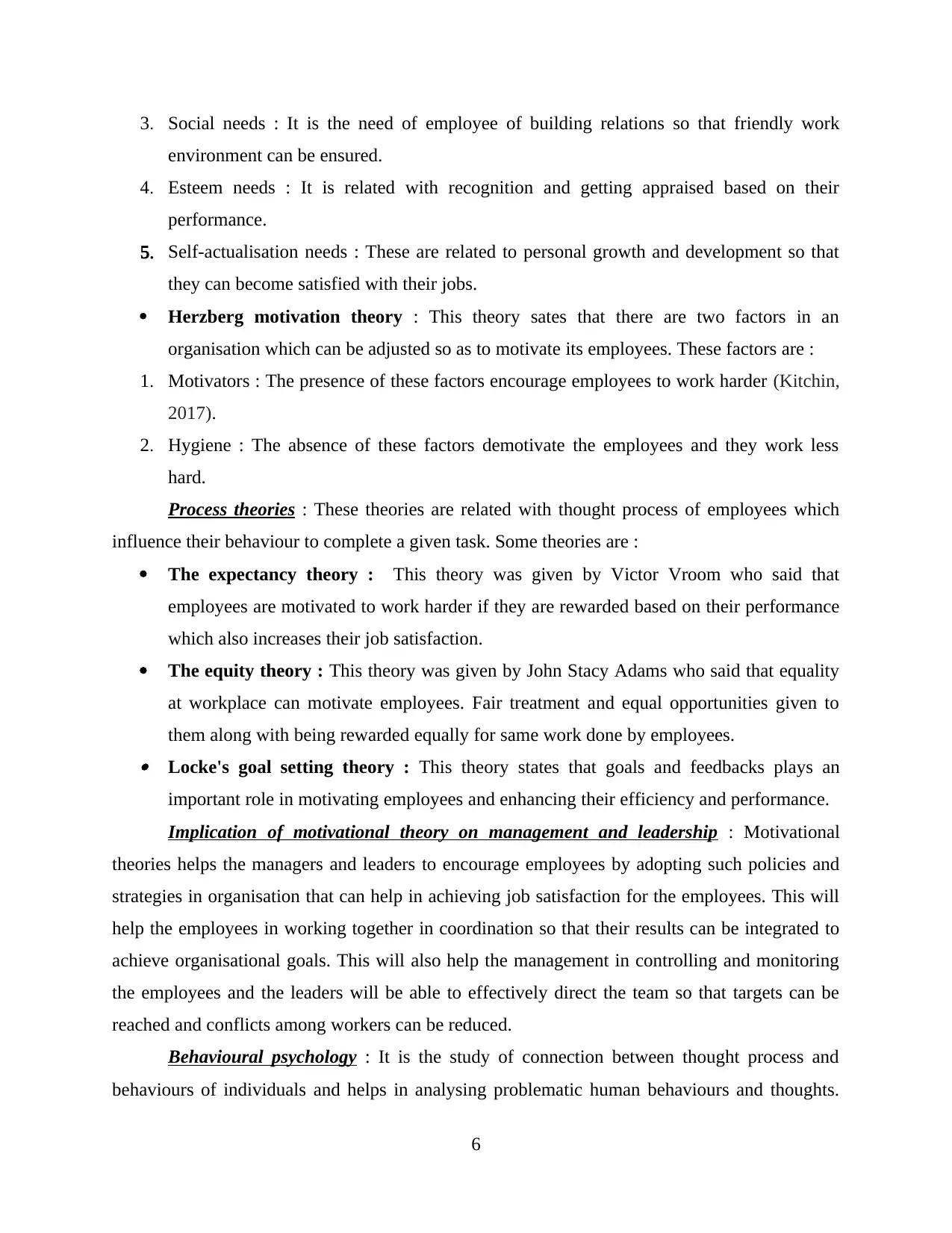
3. Social needs : It is the need of employee of building relations so that friendly work
environment can be ensured.
4. Esteem needs : It is related with recognition and getting appraised based on their
performance.
5. Self-actualisation needs : These are related to personal growth and development so that
they can become satisfied with their jobs.
Herzberg motivation theory : This theory sates that there are two factors in an
organisation which can be adjusted so as to motivate its employees. These factors are :
1. Motivators : The presence of these factors encourage employees to work harder (Kitchin,
2017).
2. Hygiene : The absence of these factors demotivate the employees and they work less
hard.
Process theories : These theories are related with thought process of employees which
influence their behaviour to complete a given task. Some theories are :
The expectancy theory : This theory was given by Victor Vroom who said that
employees are motivated to work harder if they are rewarded based on their performance
which also increases their job satisfaction.
The equity theory : This theory was given by John Stacy Adams who said that equality
at workplace can motivate employees. Fair treatment and equal opportunities given to
them along with being rewarded equally for same work done by employees. Locke's goal setting theory : This theory states that goals and feedbacks plays an
important role in motivating employees and enhancing their efficiency and performance.
Implication of motivational theory on management and leadership : Motivational
theories helps the managers and leaders to encourage employees by adopting such policies and
strategies in organisation that can help in achieving job satisfaction for the employees. This will
help the employees in working together in coordination so that their results can be integrated to
achieve organisational goals. This will also help the management in controlling and monitoring
the employees and the leaders will be able to effectively direct the team so that targets can be
reached and conflicts among workers can be reduced.
Behavioural psychology : It is the study of connection between thought process and
behaviours of individuals and helps in analysing problematic human behaviours and thoughts.
6
environment can be ensured.
4. Esteem needs : It is related with recognition and getting appraised based on their
performance.
5. Self-actualisation needs : These are related to personal growth and development so that
they can become satisfied with their jobs.
Herzberg motivation theory : This theory sates that there are two factors in an
organisation which can be adjusted so as to motivate its employees. These factors are :
1. Motivators : The presence of these factors encourage employees to work harder (Kitchin,
2017).
2. Hygiene : The absence of these factors demotivate the employees and they work less
hard.
Process theories : These theories are related with thought process of employees which
influence their behaviour to complete a given task. Some theories are :
The expectancy theory : This theory was given by Victor Vroom who said that
employees are motivated to work harder if they are rewarded based on their performance
which also increases their job satisfaction.
The equity theory : This theory was given by John Stacy Adams who said that equality
at workplace can motivate employees. Fair treatment and equal opportunities given to
them along with being rewarded equally for same work done by employees. Locke's goal setting theory : This theory states that goals and feedbacks plays an
important role in motivating employees and enhancing their efficiency and performance.
Implication of motivational theory on management and leadership : Motivational
theories helps the managers and leaders to encourage employees by adopting such policies and
strategies in organisation that can help in achieving job satisfaction for the employees. This will
help the employees in working together in coordination so that their results can be integrated to
achieve organisational goals. This will also help the management in controlling and monitoring
the employees and the leaders will be able to effectively direct the team so that targets can be
reached and conflicts among workers can be reduced.
Behavioural psychology : It is the study of connection between thought process and
behaviours of individuals and helps in analysing problematic human behaviours and thoughts.
6
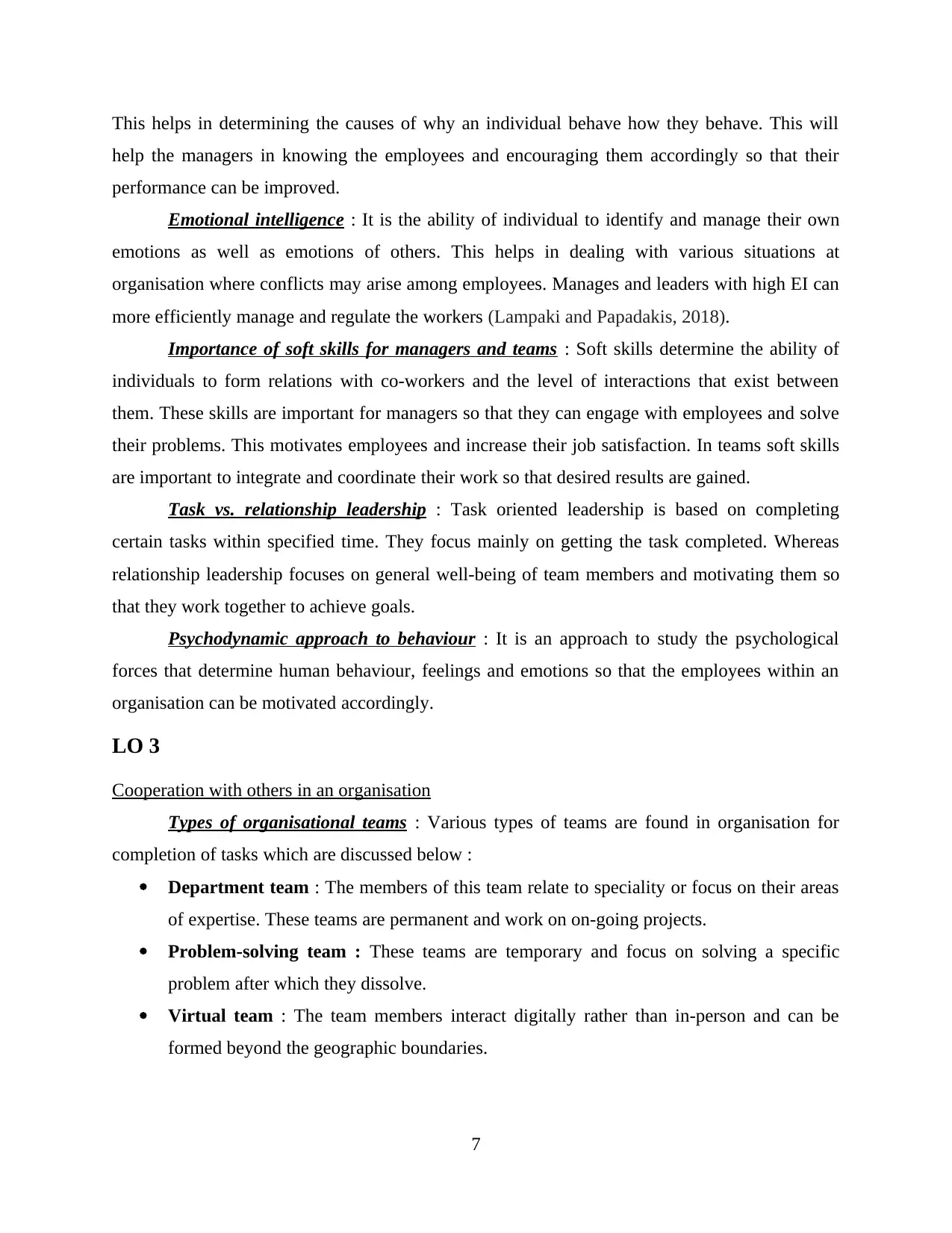
This helps in determining the causes of why an individual behave how they behave. This will
help the managers in knowing the employees and encouraging them accordingly so that their
performance can be improved.
Emotional intelligence : It is the ability of individual to identify and manage their own
emotions as well as emotions of others. This helps in dealing with various situations at
organisation where conflicts may arise among employees. Manages and leaders with high EI can
more efficiently manage and regulate the workers (Lampaki and Papadakis, 2018).
Importance of soft skills for managers and teams : Soft skills determine the ability of
individuals to form relations with co-workers and the level of interactions that exist between
them. These skills are important for managers so that they can engage with employees and solve
their problems. This motivates employees and increase their job satisfaction. In teams soft skills
are important to integrate and coordinate their work so that desired results are gained.
Task vs. relationship leadership : Task oriented leadership is based on completing
certain tasks within specified time. They focus mainly on getting the task completed. Whereas
relationship leadership focuses on general well-being of team members and motivating them so
that they work together to achieve goals.
Psychodynamic approach to behaviour : It is an approach to study the psychological
forces that determine human behaviour, feelings and emotions so that the employees within an
organisation can be motivated accordingly.
LO 3
Cooperation with others in an organisation
Types of organisational teams : Various types of teams are found in organisation for
completion of tasks which are discussed below :
Department team : The members of this team relate to speciality or focus on their areas
of expertise. These teams are permanent and work on on-going projects.
Problem-solving team : These teams are temporary and focus on solving a specific
problem after which they dissolve.
Virtual team : The team members interact digitally rather than in-person and can be
formed beyond the geographic boundaries.
7
help the managers in knowing the employees and encouraging them accordingly so that their
performance can be improved.
Emotional intelligence : It is the ability of individual to identify and manage their own
emotions as well as emotions of others. This helps in dealing with various situations at
organisation where conflicts may arise among employees. Manages and leaders with high EI can
more efficiently manage and regulate the workers (Lampaki and Papadakis, 2018).
Importance of soft skills for managers and teams : Soft skills determine the ability of
individuals to form relations with co-workers and the level of interactions that exist between
them. These skills are important for managers so that they can engage with employees and solve
their problems. This motivates employees and increase their job satisfaction. In teams soft skills
are important to integrate and coordinate their work so that desired results are gained.
Task vs. relationship leadership : Task oriented leadership is based on completing
certain tasks within specified time. They focus mainly on getting the task completed. Whereas
relationship leadership focuses on general well-being of team members and motivating them so
that they work together to achieve goals.
Psychodynamic approach to behaviour : It is an approach to study the psychological
forces that determine human behaviour, feelings and emotions so that the employees within an
organisation can be motivated accordingly.
LO 3
Cooperation with others in an organisation
Types of organisational teams : Various types of teams are found in organisation for
completion of tasks which are discussed below :
Department team : The members of this team relate to speciality or focus on their areas
of expertise. These teams are permanent and work on on-going projects.
Problem-solving team : These teams are temporary and focus on solving a specific
problem after which they dissolve.
Virtual team : The team members interact digitally rather than in-person and can be
formed beyond the geographic boundaries.
7
⊘ This is a preview!⊘
Do you want full access?
Subscribe today to unlock all pages.

Trusted by 1+ million students worldwide
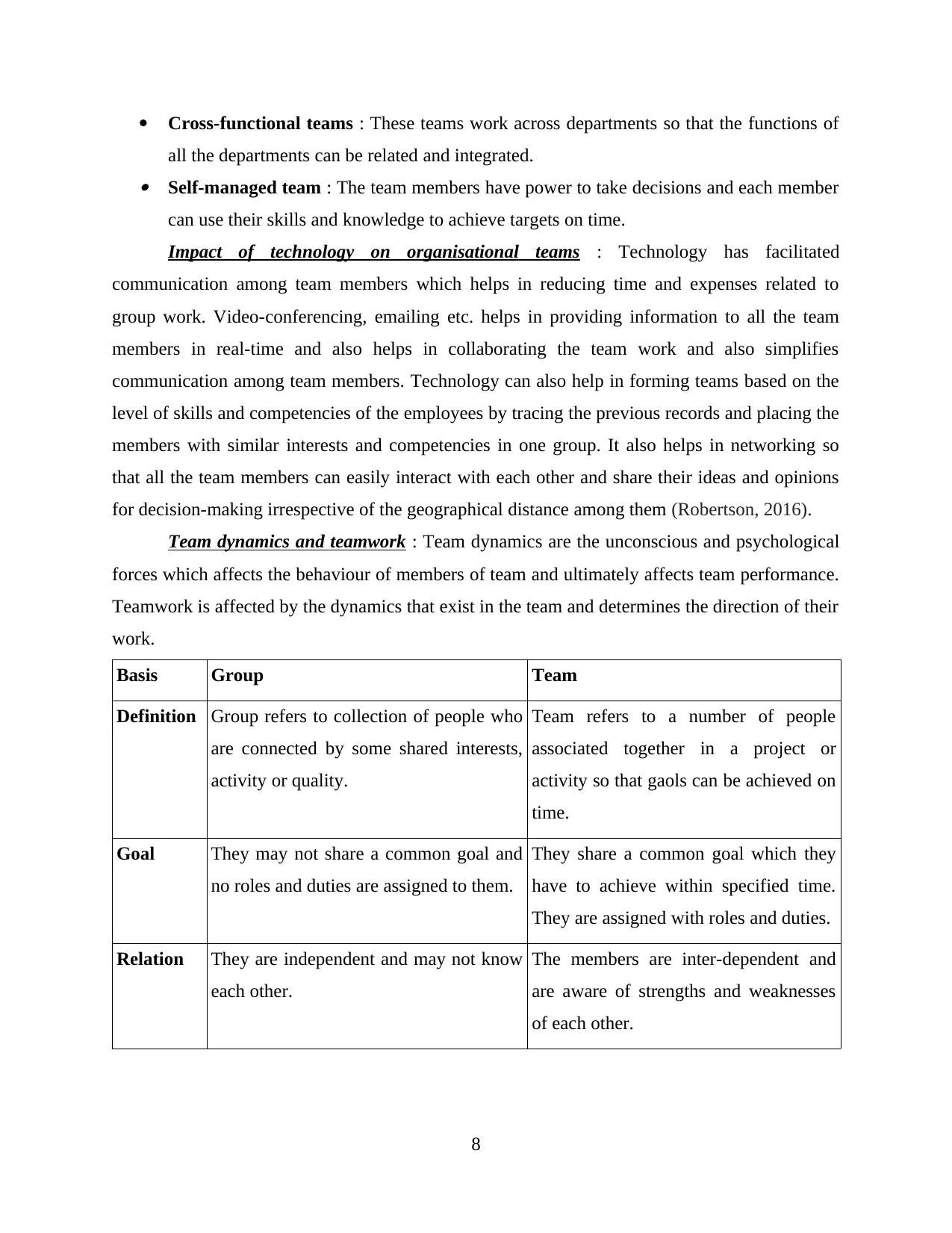
Cross-functional teams : These teams work across departments so that the functions of
all the departments can be related and integrated. Self-managed team : The team members have power to take decisions and each member
can use their skills and knowledge to achieve targets on time.
Impact of technology on organisational teams : Technology has facilitated
communication among team members which helps in reducing time and expenses related to
group work. Video-conferencing, emailing etc. helps in providing information to all the team
members in real-time and also helps in collaborating the team work and also simplifies
communication among team members. Technology can also help in forming teams based on the
level of skills and competencies of the employees by tracing the previous records and placing the
members with similar interests and competencies in one group. It also helps in networking so
that all the team members can easily interact with each other and share their ideas and opinions
for decision-making irrespective of the geographical distance among them (Robertson, 2016).
Team dynamics and teamwork : Team dynamics are the unconscious and psychological
forces which affects the behaviour of members of team and ultimately affects team performance.
Teamwork is affected by the dynamics that exist in the team and determines the direction of their
work.
Basis Group Team
Definition Group refers to collection of people who
are connected by some shared interests,
activity or quality.
Team refers to a number of people
associated together in a project or
activity so that gaols can be achieved on
time.
Goal They may not share a common goal and
no roles and duties are assigned to them.
They share a common goal which they
have to achieve within specified time.
They are assigned with roles and duties.
Relation They are independent and may not know
each other.
The members are inter-dependent and
are aware of strengths and weaknesses
of each other.
8
all the departments can be related and integrated. Self-managed team : The team members have power to take decisions and each member
can use their skills and knowledge to achieve targets on time.
Impact of technology on organisational teams : Technology has facilitated
communication among team members which helps in reducing time and expenses related to
group work. Video-conferencing, emailing etc. helps in providing information to all the team
members in real-time and also helps in collaborating the team work and also simplifies
communication among team members. Technology can also help in forming teams based on the
level of skills and competencies of the employees by tracing the previous records and placing the
members with similar interests and competencies in one group. It also helps in networking so
that all the team members can easily interact with each other and share their ideas and opinions
for decision-making irrespective of the geographical distance among them (Robertson, 2016).
Team dynamics and teamwork : Team dynamics are the unconscious and psychological
forces which affects the behaviour of members of team and ultimately affects team performance.
Teamwork is affected by the dynamics that exist in the team and determines the direction of their
work.
Basis Group Team
Definition Group refers to collection of people who
are connected by some shared interests,
activity or quality.
Team refers to a number of people
associated together in a project or
activity so that gaols can be achieved on
time.
Goal They may not share a common goal and
no roles and duties are assigned to them.
They share a common goal which they
have to achieve within specified time.
They are assigned with roles and duties.
Relation They are independent and may not know
each other.
The members are inter-dependent and
are aware of strengths and weaknesses
of each other.
8
Paraphrase This Document
Need a fresh take? Get an instant paraphrase of this document with our AI Paraphraser
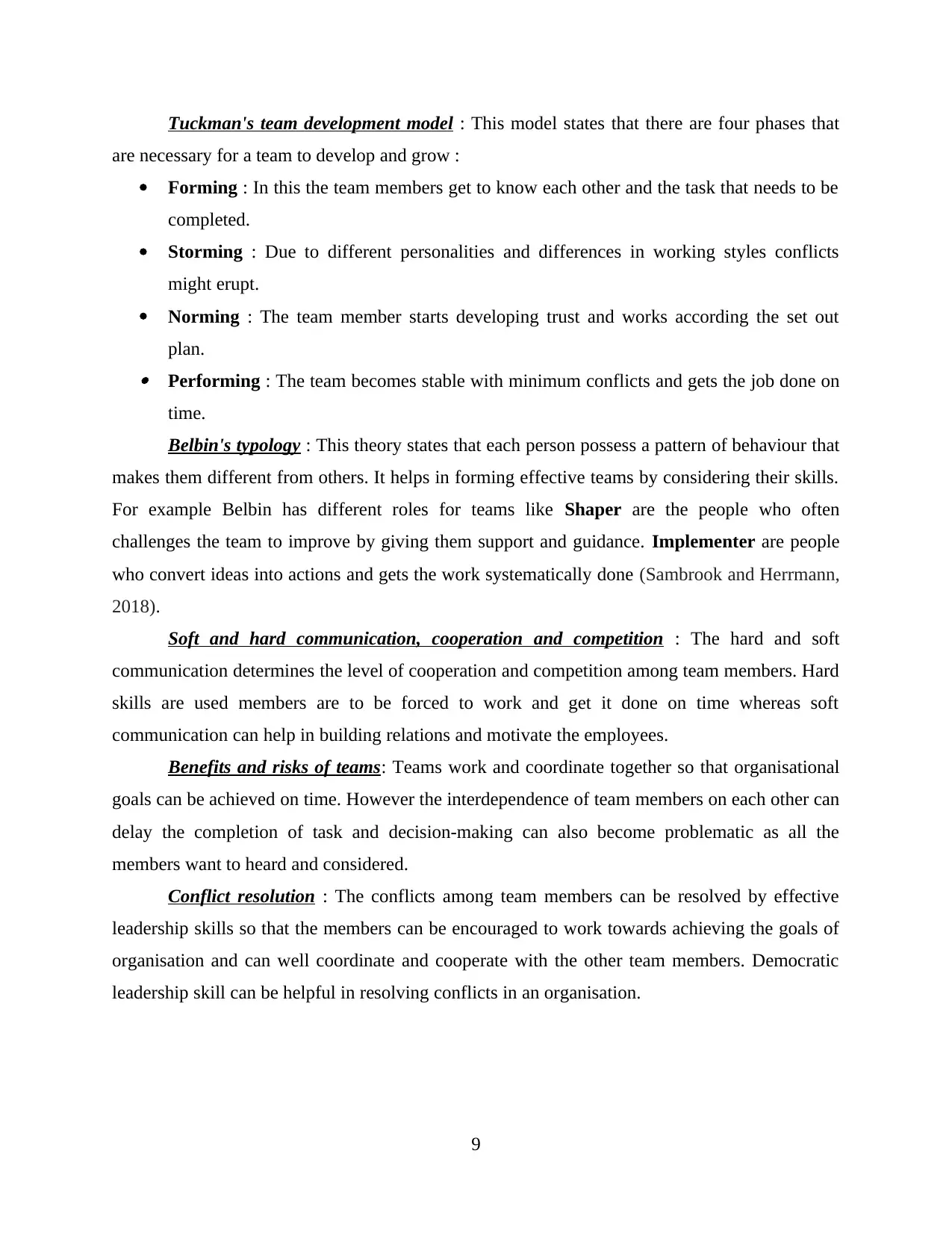
Tuckman's team development model : This model states that there are four phases that
are necessary for a team to develop and grow :
Forming : In this the team members get to know each other and the task that needs to be
completed.
Storming : Due to different personalities and differences in working styles conflicts
might erupt.
Norming : The team member starts developing trust and works according the set out
plan. Performing : The team becomes stable with minimum conflicts and gets the job done on
time.
Belbin's typology : This theory states that each person possess a pattern of behaviour that
makes them different from others. It helps in forming effective teams by considering their skills.
For example Belbin has different roles for teams like Shaper are the people who often
challenges the team to improve by giving them support and guidance. Implementer are people
who convert ideas into actions and gets the work systematically done (Sambrook and Herrmann,
2018).
Soft and hard communication, cooperation and competition : The hard and soft
communication determines the level of cooperation and competition among team members. Hard
skills are used members are to be forced to work and get it done on time whereas soft
communication can help in building relations and motivate the employees.
Benefits and risks of teams: Teams work and coordinate together so that organisational
goals can be achieved on time. However the interdependence of team members on each other can
delay the completion of task and decision-making can also become problematic as all the
members want to heard and considered.
Conflict resolution : The conflicts among team members can be resolved by effective
leadership skills so that the members can be encouraged to work towards achieving the goals of
organisation and can well coordinate and cooperate with the other team members. Democratic
leadership skill can be helpful in resolving conflicts in an organisation.
9
are necessary for a team to develop and grow :
Forming : In this the team members get to know each other and the task that needs to be
completed.
Storming : Due to different personalities and differences in working styles conflicts
might erupt.
Norming : The team member starts developing trust and works according the set out
plan. Performing : The team becomes stable with minimum conflicts and gets the job done on
time.
Belbin's typology : This theory states that each person possess a pattern of behaviour that
makes them different from others. It helps in forming effective teams by considering their skills.
For example Belbin has different roles for teams like Shaper are the people who often
challenges the team to improve by giving them support and guidance. Implementer are people
who convert ideas into actions and gets the work systematically done (Sambrook and Herrmann,
2018).
Soft and hard communication, cooperation and competition : The hard and soft
communication determines the level of cooperation and competition among team members. Hard
skills are used members are to be forced to work and get it done on time whereas soft
communication can help in building relations and motivate the employees.
Benefits and risks of teams: Teams work and coordinate together so that organisational
goals can be achieved on time. However the interdependence of team members on each other can
delay the completion of task and decision-making can also become problematic as all the
members want to heard and considered.
Conflict resolution : The conflicts among team members can be resolved by effective
leadership skills so that the members can be encouraged to work towards achieving the goals of
organisation and can well coordinate and cooperate with the other team members. Democratic
leadership skill can be helpful in resolving conflicts in an organisation.
9
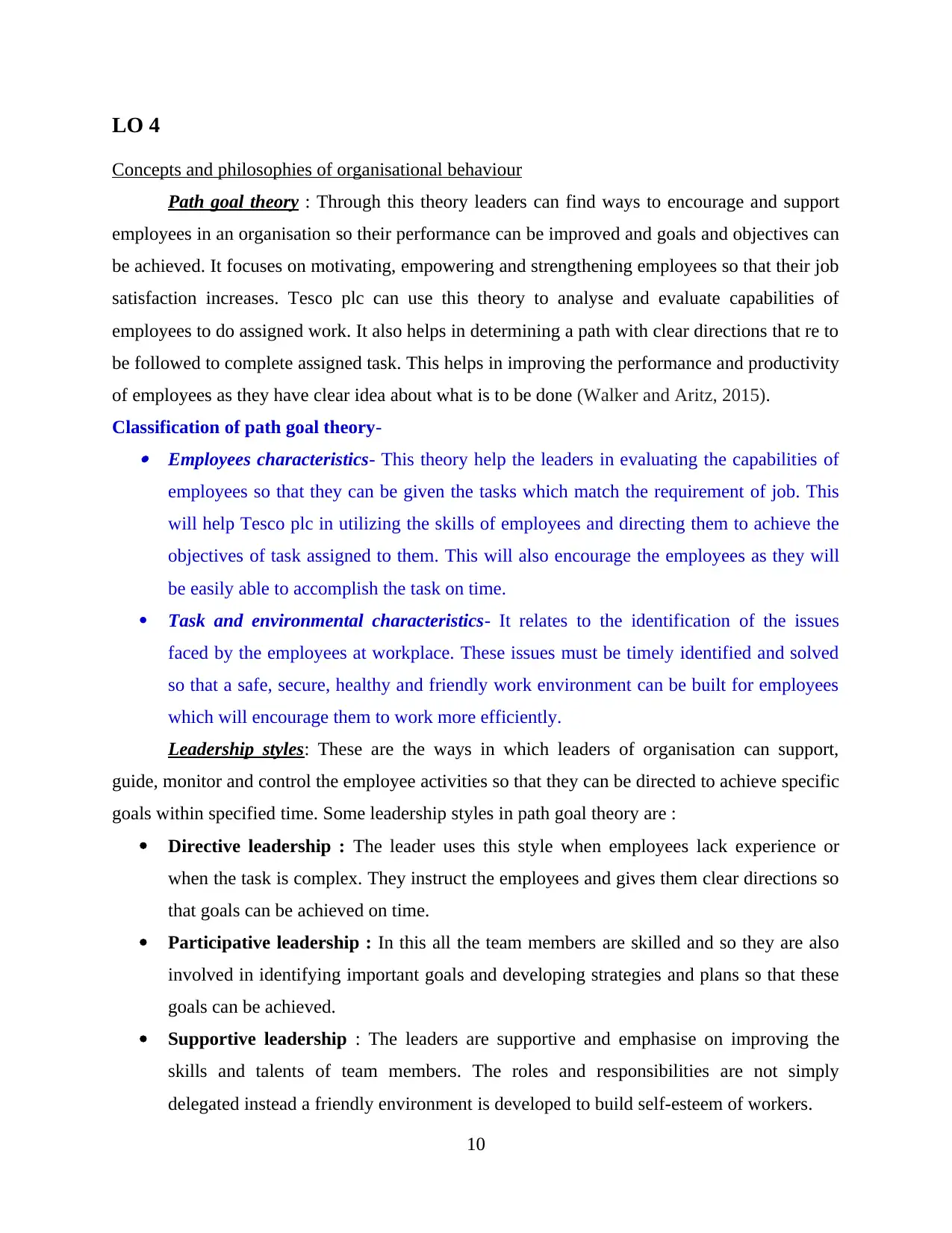
LO 4
Concepts and philosophies of organisational behaviour
Path goal theory : Through this theory leaders can find ways to encourage and support
employees in an organisation so their performance can be improved and goals and objectives can
be achieved. It focuses on motivating, empowering and strengthening employees so that their job
satisfaction increases. Tesco plc can use this theory to analyse and evaluate capabilities of
employees to do assigned work. It also helps in determining a path with clear directions that re to
be followed to complete assigned task. This helps in improving the performance and productivity
of employees as they have clear idea about what is to be done (Walker and Aritz, 2015).
Classification of path goal theory- Employees characteristics- This theory help the leaders in evaluating the capabilities of
employees so that they can be given the tasks which match the requirement of job. This
will help Tesco plc in utilizing the skills of employees and directing them to achieve the
objectives of task assigned to them. This will also encourage the employees as they will
be easily able to accomplish the task on time.
Task and environmental characteristics- It relates to the identification of the issues
faced by the employees at workplace. These issues must be timely identified and solved
so that a safe, secure, healthy and friendly work environment can be built for employees
which will encourage them to work more efficiently.
Leadership styles: These are the ways in which leaders of organisation can support,
guide, monitor and control the employee activities so that they can be directed to achieve specific
goals within specified time. Some leadership styles in path goal theory are :
Directive leadership : The leader uses this style when employees lack experience or
when the task is complex. They instruct the employees and gives them clear directions so
that goals can be achieved on time.
Participative leadership : In this all the team members are skilled and so they are also
involved in identifying important goals and developing strategies and plans so that these
goals can be achieved.
Supportive leadership : The leaders are supportive and emphasise on improving the
skills and talents of team members. The roles and responsibilities are not simply
delegated instead a friendly environment is developed to build self-esteem of workers.
10
Concepts and philosophies of organisational behaviour
Path goal theory : Through this theory leaders can find ways to encourage and support
employees in an organisation so their performance can be improved and goals and objectives can
be achieved. It focuses on motivating, empowering and strengthening employees so that their job
satisfaction increases. Tesco plc can use this theory to analyse and evaluate capabilities of
employees to do assigned work. It also helps in determining a path with clear directions that re to
be followed to complete assigned task. This helps in improving the performance and productivity
of employees as they have clear idea about what is to be done (Walker and Aritz, 2015).
Classification of path goal theory- Employees characteristics- This theory help the leaders in evaluating the capabilities of
employees so that they can be given the tasks which match the requirement of job. This
will help Tesco plc in utilizing the skills of employees and directing them to achieve the
objectives of task assigned to them. This will also encourage the employees as they will
be easily able to accomplish the task on time.
Task and environmental characteristics- It relates to the identification of the issues
faced by the employees at workplace. These issues must be timely identified and solved
so that a safe, secure, healthy and friendly work environment can be built for employees
which will encourage them to work more efficiently.
Leadership styles: These are the ways in which leaders of organisation can support,
guide, monitor and control the employee activities so that they can be directed to achieve specific
goals within specified time. Some leadership styles in path goal theory are :
Directive leadership : The leader uses this style when employees lack experience or
when the task is complex. They instruct the employees and gives them clear directions so
that goals can be achieved on time.
Participative leadership : In this all the team members are skilled and so they are also
involved in identifying important goals and developing strategies and plans so that these
goals can be achieved.
Supportive leadership : The leaders are supportive and emphasise on improving the
skills and talents of team members. The roles and responsibilities are not simply
delegated instead a friendly environment is developed to build self-esteem of workers.
10
⊘ This is a preview!⊘
Do you want full access?
Subscribe today to unlock all pages.

Trusted by 1+ million students worldwide
1 out of 15
Related Documents
Your All-in-One AI-Powered Toolkit for Academic Success.
+13062052269
info@desklib.com
Available 24*7 on WhatsApp / Email
![[object Object]](/_next/static/media/star-bottom.7253800d.svg)
Unlock your academic potential
Copyright © 2020–2026 A2Z Services. All Rights Reserved. Developed and managed by ZUCOL.





